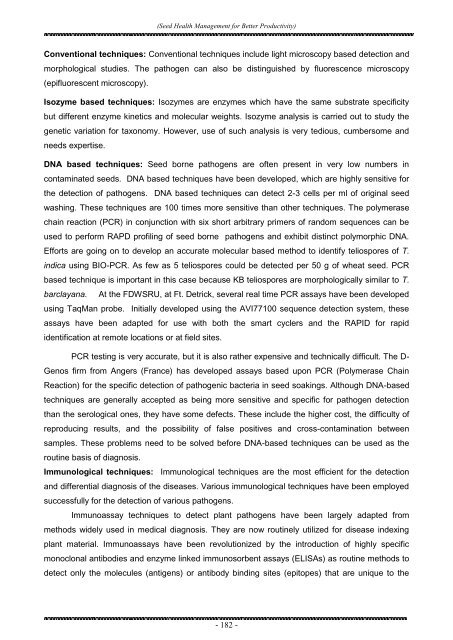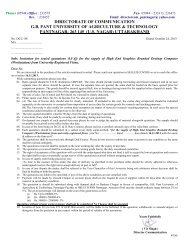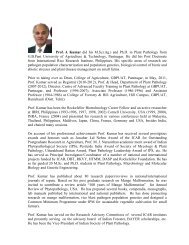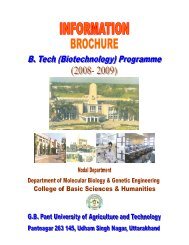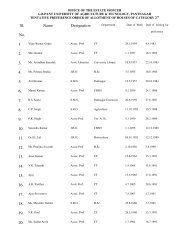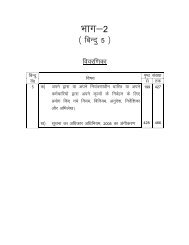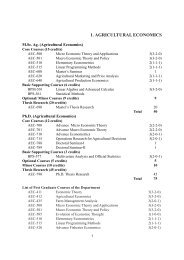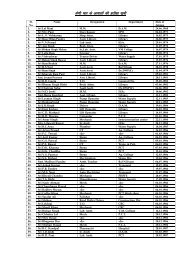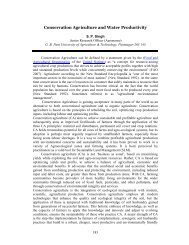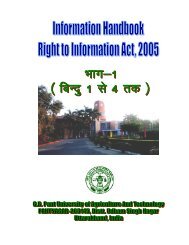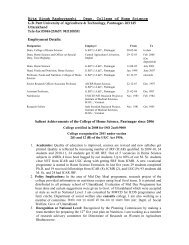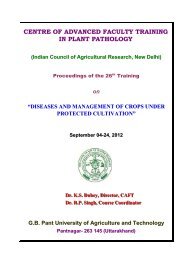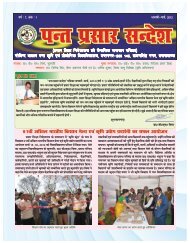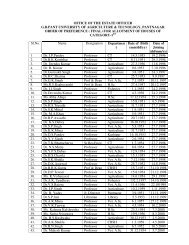Seed Health Management for Better Productivity - Govind Ballabh ...
Seed Health Management for Better Productivity - Govind Ballabh ...
Seed Health Management for Better Productivity - Govind Ballabh ...
Create successful ePaper yourself
Turn your PDF publications into a flip-book with our unique Google optimized e-Paper software.
(<strong>Seed</strong> <strong>Health</strong> <strong>Management</strong> <strong>for</strong> <strong>Better</strong> <strong>Productivity</strong>)Conventional techniques: Conventional techniques include light microscopy based detection andmorphological studies. The pathogen can also be distinguished by fluorescence microscopy(epifluorescent microscopy).Isozyme based techniques: Isozymes are enzymes which have the same substrate specificitybut different enzyme kinetics and molecular weights. Isozyme analysis is carried out to study thegenetic variation <strong>for</strong> taxonomy. However, use of such analysis is very tedious, cumbersome andneeds expertise.DNA based techniques: <strong>Seed</strong> borne pathogens are often present in very low numbers incontaminated seeds. DNA based techniques have been developed, which are highly sensitive <strong>for</strong>the detection of pathogens. DNA based techniques can detect 2-3 cells per ml of original seedwashing. These techniques are 100 times more sensitive than other techniques. The polymerasechain reaction (PCR) in conjunction with six short arbitrary primers of random sequences can beused to per<strong>for</strong>m RAPD profiling of seed borne pathogens and exhibit distinct polymorphic DNA.Ef<strong>for</strong>ts are going on to develop an accurate molecular based method to identify teliospores of T.indica using BIO-PCR. As few as 5 teliospores could be detected per 50 g of wheat seed. PCRbased technique is important in this case because KB teliospores are morphologically similar to T.barclayana. At the FDWSRU, at Ft. Detrick, several real time PCR assays have been developedusing TaqMan probe. Initially developed using the AVI77100 sequence detection system, theseassays have been adapted <strong>for</strong> use with both the smart cyclers and the RAPID <strong>for</strong> rapididentification at remote locations or at field sites.PCR testing is very accurate, but it is also rather expensive and technically difficult. The D-Genos firm from Angers (France) has developed assays based upon PCR (Polymerase ChainReaction) <strong>for</strong> the specific detection of pathogenic bacteria in seed soakings. Although DNA-basedtechniques are generally accepted as being more sensitive and specific <strong>for</strong> pathogen detectionthan the serological ones, they have some defects. These include the higher cost, the difficulty ofreproducing results, and the possibility of false positives and cross-contamination betweensamples. These problems need to be solved be<strong>for</strong>e DNA-based techniques can be used as theroutine basis of diagnosis.Immunological techniques: Immunological techniques are the most efficient <strong>for</strong> the detectionand differential diagnosis of the diseases. Various immunological techniques have been employedsuccessfully <strong>for</strong> the detection of various pathogens.Immunoassay techniques to detect plant pathogens have been largely adapted frommethods widely used in medical diagnosis. They are now routinely utilized <strong>for</strong> disease indexingplant material. Immunoassays have been revolutionized by the introduction of highly specificmonoclonal antibodies and enzyme linked immunosorbent assays (ELISAs) as routine methods todetect only the molecules (antigens) or antibody binding sites (epitopes) that are unique to the- 182 -


